

KSC SEMINARS

Date & Time: June 11th, 2018 at 3pm
Venue: Building 5, room 5220
Light refreshments will be provided.
Abstract: The commercialization of OPV requires the availability of inexpensive materials in large quantities, such as poly(3-hexylthiophene) (P3HT). P3HT is readily scalable via flow or micro-reactor synthesis, even using green solvents, whilst retaining a high degree of control over molecular weight and regioregularity. However, it has a limited open-circuit voltage (Voc), short-circuit current (Jsc) and stability in photovoltaic devices when fullerene derivatives are used as acceptors. This talk will focus on the alternative small molecule non-fullerene acceptors that can potentially lead to commercially available organic photovoltaics. In particular, structure-property relations, recombination processes and reliability results for record efficiencies will be discussed.
Biography: Dr. Derya Baran earned her B.Sc. degree from the Department of Chemistry, Middle East Technical University-Turkey in 2008 and completed her M.Sc. studies in 2010. Afterwards, she received her doctorate degree in Material Science and Engineering from Friedrich-Alexander Erlangen-Nürnberg University in 2014. In 2015, she received the Helmholtz Association postdoc grant in Germany and pursued post-doctoral studies at Jülich Research Center (Germany) and Imperial Collage London (UK) and. Since January 2017, she is a faculty at King Abdullah University of Science and Technology (KAUST) in Material Science and Engineering Division. She has co-authored >70 publications in peer-reviewed journals including Nature Materials and Nature Energy. Her current research focus on the engineering smart materials for organic electronic applications such as solar cells, thermoelectrics and photodetectors.